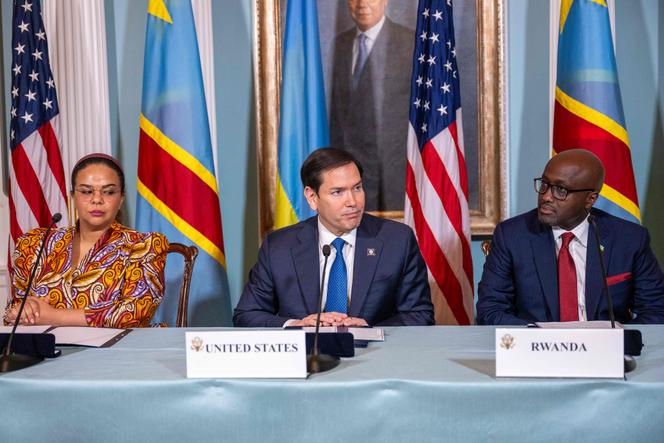


Rwanda and the Democratic Republic of Congo set a goal Friday, April 25, of reaching a draft peace agreement by May 2 and vowed to respect each other's sovereignty, but mutual suspicion lay deep at a signing in Washington. Two days after Qatar mediated a surprise truce, the United States brought the two countries' foreign ministers together and voiced an interest in investment in the Democratic Republic of Congo's turbulent but mineral-rich east. M23 rebels, who UN experts and the United States say have received military support from Rwanda, have made rapid advances in the eastern DRC since January, seizing key cities in fighting that has killed thousands.
A joint declaration signed in the presence of Secretary of State Marco Rubio committed the two countries to come up with an "initial draft peace agreement" by May 2. The two countries "mutually acknowledge each other's sovereignty and territorial integrity and commit to a pathway to resolve their disputes by peaceful means grounded in diplomacy and negotiation rather than hostile force or rhetoric," the declaration said. Without naming the M23 rebels explicitly, it said that each country acknowledged concerns of the other and would "refrain from providing state military support to non-state armed groups."
Congolese Foreign Minister Therese Kayikwamba Wagner said that the declaration should be considered a commitment for a Rwandan withdrawal from her country, as laid out in a UN Security Council resolution in February. "The good news is there is hope for peace. The real news – peace must be earned, and it will require seriousness, transparency and sincerity," she said. "To our countrymen and women in the Democratic Republic of the Congo, especially in the east: we know you are watching this moment with concern, with hope and, yes, with doubt, and you're right to do so."
Kayikwamba and Rwandan Foreign Minister Olivier Nduhungirehe signed the agreement separately with Rubio watching and did not shake hands with each other for the cameras. Nduhungirehe said that President Donald Trump had made a "real change in the conversation" on DR Congo, including by drawing a link to efforts to expand US private-sector investment. "Today we are talking about the real issues, the root causes that must be addressed to achieve a lasting peace in our region," he said, calling for a region "free of violent ethnic extremism."
Rwanda has denied military support for the M23, who are mostly Tutsis. But it says its security has been threatened by armed groups that have lingered in the eastern DRC for decades – notably the Democratic Forces for the Liberation of Rwanda, created by former Hutu leaders linked to the 1994 genocide of the Tutsi in Rwanda.
A new US envoy for Africa businessman Massad Boulos, who is the father-in-law of Trump's daughter Tiffany – visited both countries this month and called for Rwanda to halt support to the M23 and pull out troops.
The joint declaration said the two sides should expect "significant investments" facilitated by the US government and US private sector, including in hydropower and minerals – an area where China has been active in the hunt for resources. "Durable peace in the Great Lakes region will open the door for greater US and broader Western investment, which will bring about economic opportunities and prosperity," Rubio said at the signing. "It's, as they call it, a win-win for everyone involved," he said.
Former president Joe Biden's administration also sought to resolve the conflict, offering US monitoring of a ceasefire and the expansion of a signature US railway project, but ultimately said Rwanda was not interested.
Martin Ziakwau Lembisa, an international relations expert at the Catholic University of Congo, said that Rwanda wanted to ease foreign pressure and that the M23 had achieved key demands after the Kinshasa government reversed course and said it would negotiate with the rebels.
"I think that American pressure helped bring the sides to the diplomatic option, because if it were up to the M23, they would have advanced further in their offensive," he said. "But how far the Americans will really get involved is the whole question."
